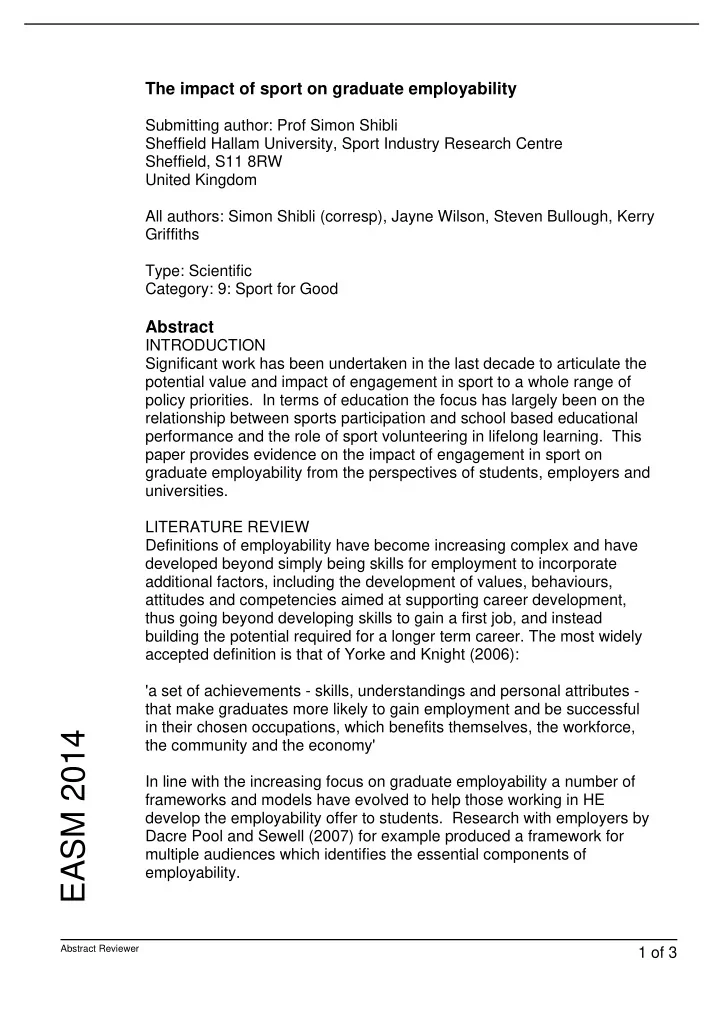

The impact of sport on graduate employability Submitting author: Prof Simon Shibli Sheffield Hallam University, Sport Industry Research Centre Sheffield, S11 8RW United Kingdom All authors: Simon Shibli (corresp), Jayne Wilson, Steven Bullough, Kerry Griffiths Type: Scientific Category: 9: Sport for Good Abstract INTRODUCTION� Significant work has been undertaken in the last decade to articulate the potential value and impact of engagement in sport to a whole range of policy priorities. In terms of education the focus has largely been on the relationship between sports participation and school based educational performance and the role of sport volunteering in lifelong learning. This paper provides evidence on the impact of engagement in sport on graduate employability from the perspectives of students, employers and universities. � � LITERATURE REVIEW� Definitions of employability have become increasing complex and have developed beyond simply being skills for employment to incorporate additional factors, including the development of values, behaviours, attitudes and competencies aimed at supporting career development, thus going beyond developing skills to gain a first job, and instead building the potential required for a longer term career. The most widely accepted definition is that of Yorke and Knight (2006):� � 'a set of achievements - skills, understandings and personal attributes - that make graduates more likely to gain employment and be successful in their chosen occupations, which benefits themselves, the workforce, EASM 2014 the community and the economy'� � In line with the increasing focus on graduate employability a number of frameworks and models have evolved to help those working in HE develop the employability offer to students. Research with employers by Dacre Pool and Sewell (2007) for example produced a framework for multiple audiences which identifies the essential components of employability.� � Abstract Reviewer 1 of 3
Our literature search found there is a clear lack of material which explores explicitly the role of sport in developing employability. Some attention has been paid to the influence of extra-curricular activity on academic achievement demonstrating that extra-curricular activity can be positively linked to high achievement, and that in particular students who participate are often more productive, through developing good time management skills. There is relatively little research into the influence of extra-curricular activity and sport on the transition to employment.� � Some academics have looked at the impact of participation on earnings, for example Eide and Ronan (2001) found that participation in varsity sports in the United States had a positive impact upon future earnings - a finding replicated on a smaller scale in the UK by Tchibozo (2007). Leung (2003) also found that participation in extra-curricular activity made adjustment to the 'real world' upon graduation much smoother.� � METHODOLOGY� � The research used a mixed methods approach which included: secondary analysis of three datasets relating directly or indirectly to graduate employment; and primary research with three key graduates, employers and university senior executives. Existing research was used to operationalise the definition of employability being tested and its various sub components to ensure consistency with current thinking. The research achieved responses from nearly 6,000 graduates via an online survey, 112 graduate employers and 13 senior executives interviewed in person or via the telephone. The outputs from the various components of the research were used to triangulate the overall findings and conclusions. From a theoretical perspective we were interested in identifying if there was a causal link between engagement in sport and employability and in the direction of any causality.� RESULTS� As the number of graduates increases, students need to do more than pass a degree to get their first job and to sustain their employability. The evidence indicates strongly that in the context of rising fees, engagement in sport is associated with a good career return on investment of between £4,264 and £5,616 per annum. Graduates recognise that engagement in sport provides a wide range of positive attributes required by employers EASM 2014 notably: team working, communication skills, motivation, competitiveness and resilience. However enhanced employability is not just about playing sport. Employers consider that leadership positions, organisational roles and other positions of responsibility within sports clubs and societies were particularly beneficial in providing 'added value' for graduate employability. Some students who engage in sport are able to make the best use of their experience in a recruitment process by demonstrating transferable skills on their application forms and in interview situations. There is a need to ensure that the value of engagement in sport (as recognised by graduate employers) is communicated and promoted in Abstract Reviewer 2 of 3
universities to all who have a role is helping graduates prepare for employment. Evidence from both the secondary analysis and the primary research with graduates indicates that it is engagement in sport that has a positive impact on employability, rather than people with desirable employability traits gravitating naturally towards sport. References Dacre Pool, L., and Sewell, P. (2007) The Key to Employability: Developing a Practical Model of Graduate Employability. Education and Training. 49 (4). pp. 277-289.� � Eide, E. R., and Ronan, N. (2001). Is Participation in High School Athletics an Investment or a Consumption Good? Economics of Education Review. 20 (5). pp. 431-442.� � Leung, Chi Cheung. (2003). Extra-curricular Music Activities in Hong- Kong Secondary Schools. Music Education Research. 5 (2). pp. 183- 197. � � Tchibozo, G. (2007).Extra-curricular Activity and the Transition from Higher Education to Work: A Survey of Graduates in the United Kingdom. Higher Education Quarterly. 61 (1). pp. 37-56. � � Yorke, M. (2006). Employability in Higher Education: What it is – What it is Not. York: The Higher Education Academy. EASM 2014 Abstract Reviewer 3 of 3
Recommend
More recommend